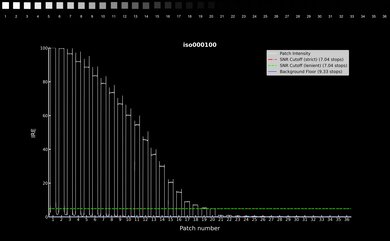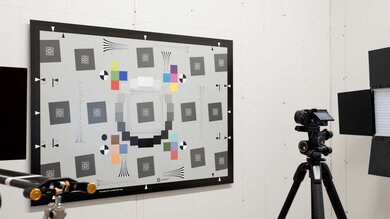
Upgrading from a smartphone to a dedicated camera can be a good way to step up your content game if you want to stand out from the sea of personal blogs online. While image quality is important, there are other things to look for when buying a camera for blogging, which will largely depend on what kind of blog you run. Travel bloggers might prioritize portability for easier storage and travel, while those planning on incorporating videos into their blogs might value a fully articulated screen and different frame rate options. Food bloggers might want a hybrid camera to take high-quality photos and record video tutorials of their recipes. No matter what kind of blog you run, the good news is that most modern cameras are very capable for both photo and video work, and there are plenty of models for every budget and experience level.
We've bought and tested over 115 cameras in our lab, and below, you'll find our recommendations for the best blog cameras. If you're mostly interested in the video side of things, you can also check out our picks for the best vlogging cameras. Aspiring travel bloggers might also want to look at the best travel cameras or the best compact cameras we've tested. Alternatively, if you've just set up an online shop, you should consider some of our best cameras for product photography instead.
-
Best Camera For Blogging
Travel Photography7.9Landscape Photography7.8Sport & Wildlife Photography8.4Vlogging7.5Studio Video7.8Action Video4.9Performance Usages: Raw Photo7.5The Canon EOS R10 is the best camera for bloggers that we've tested. This entry-level APS-C camera offers a ton of value for its price and will suit most bloggers well for everything from capturing high-quality stills to incorporating short videos. Canon's user interface is very beginner-friendly, and the camera has great ergonomics, making for a very intuitive shooting experience. Beyond capturing high-quality photos, with great dynamic range and plenty of fine detail, it's also a highly capable video camera, with 4k video recording at up to 60 fps (albeit with a crop) and a dedicated slow-motion mode in 1080p.
You can also buy the R10 in a 'Content Creator Kit' bundle that includes a stereo mic and tripod grip to help you record vlogs and videos. If you're more interested in the video side of things, the Sony ZV-E10 II is the best alternative at this price point. It's a specifically vlog-oriented camera, so there's no viewfinder, which makes it a bit less versatile for photography. However, it has slightly more advanced video features than the R10, including a wide range of frame rate options and support for internal 10-bit color and Log recording.
-
Best Mid-Range Camera For Blogging
Travel Photography8.2Landscape Photography8.1Sport & Wildlife Photography7.5Vlogging7.4Studio Video7.5Action Video5.6Performance Usages: Raw Photo7.9The Sony α6400 is the best mid-range camera we've tested for blogging. It's showing its age a bit now, with an outdated user interface that's less intuitive than the interface on the Canon EOS R10, but this is still a well-rounded camera. What it lacks in menu organization and ergonomics, it makes up for in portability, allowing you to easily take it on the go. Sony's E mount also includes a wide selection of native and third-party lenses for both APS-C and full frame sensors, making this a great choice if you eventually decide to upgrade to a higher-end camera body.
Beyond that, it has one of the most reliable autofocus systems in its class, so you rarely have to worry about missing focus. The battery life is very good for a mirrorless camera, too. If you're looking for something a bit more robust, however, consider the Nikon Z 50. It's less portable, but it has significantly better ergonomics, including a larger viewfinder, although lens options are more limited for Nikon's Z system.
-
Best Budget Camera For Blogging
Travel Photography7.9Landscape Photography7.5Sport & Wildlife Photography8.0Vlogging7.9Studio Video7.7Action Video4.9Performance Usages: Raw Photo7.4The Canon EOS R50 is easily one of the best budget cameras we've tested, and it's an especially great choice for beginner photographers and bloggers. Its portable design makes it easy to take anywhere, making it a good fit for travel blogs. Like most of our picks here, it uses an APS-C sensor with great overall image quality. The camera's intelligent auto mode is also useful for those who don't yet know their way around a camera.
If you're looking for a more portable overall kit, the Olympus OM-D E-M10 Mark IV is another good budget camera, though it's a tad more expensive than the R50. It's one of the few budget cameras to offer IBIS for steadier handheld shooting. Plus, it's part of the Micro Four Thirds system, which has a more established lens ecosystem than Canon's RF system. That said, its autofocus isn't nearly as reliable as the Canon's.
-
Best Point-And-Shoot Camera For Blogging
Travel Photography7.4Landscape Photography7.2Sport & Wildlife Photography7.3Vlogging7.9Studio Video7.0Action Video5.2Performance Usages: Raw Photo6.5While an interchangeable lens model will give you more versatility, a compact point-and-shoot camera is a great choice for bloggers who frequently shoot on the go. Enter the Sony ZV-1, which is portable enough to fit into a coat pocket or small bag. While it's designed specifically for vlogging, the ZV-1 is also a capable stills camera. Its built-in lens doesn't have the longest zoom range, but it still gives you a bit of flexibility to adjust your framing or capture subjects that are a little farther away.
The camera also has several helpful features for vloggers and bloggers, including a dedicated 'Background Defocus' button that toggles between a shallow and wide depth of field and a 'Product Showcase' mode that quickly shifts focus from faces to any objects held up in the frame. Of course, going with a point-and-shoot camera means sacrificing battery life, and overheating can be an issue for longer recording sessions, but this is still a great option for bloggers and vloggers who need something compact. The newer Sony ZV-1 II offers a wider-angle lens, but the ZV-1 is cheaper and includes optical stabilization, so it's still our top compact pick for blogging.
Notable Mentions
- Canon PowerShot G7 X Mark III: The Canon PowerShot G7 X Mark III is a compact point-and-shoot camera with a built-in YouTube livestreaming feature and a more intuitive menu system than the Sony ZV-1. That said, its image quality and autofocus tracking performance are worse overall. See our review
- Fujifilm X-M5:
The Fujifilm X-M5 is an incredibly portable and high-value mid-range option that's especially well-suited for travel bloggers. It's more compact than the Sony α6400, with more advanced video features, but it lacks a viewfinder, which is a dealbreaker for some. Beyond that, with its extensive lens options, class-leading autofocus, and cheaper secondhand prices, the Sony offers better value overall.
See our review - Nikon Z fc: The Nikon Z fc is a retro-inspired camera that will appeal to style-conscious photographers. However, you're paying a slight premium for the vintage look, and the lack of handgrip makes it less comfortable to shoot with than the Canon EOS R10. See our review
- OM SYSTEM OM-5: The OM SYSTEM OM-5 is a Micro Four Thirds camera that's cheaper and more portable than the Canon EOS R10. That said, its autofocus tracking system isn't as effective, and it's a bit more limited for video work. See our review
Recent Updates
-
We added the Fujifilm X-M5 as a Notable Mention due to its compact size and excellent value.
-
We added a comparison to the Sony ZV-E10 II as a more vlog-oriented alternative to the Canon EOS R10.
-
Aug 20, 2024 : We removed mention of the Canon EOS Rebel T8i since it's harder to find and added a comparison to the Nikon Z 50 instead. We also added a link to our 'Best Cameras For Product Photography' article in the introduction.
-
May 24, 2024 : We replaced the Olympus OM-D E-M5 Mark III with the OM SYSTEM OM-5 as a Notable Mention because it's more widely available and features an improved processor.
-
Mar 28, 2024 : We've reviewed the picks for price, availability, and accuracy and determined that the current selection of cameras is still the most relevant for users.
All Reviews
Our recommendations above are what we think are currently the best cameras for most people to buy for blogging, according to their needs. We factor in the price, feedback from our visitors, and availability (no cameras that are difficult to find or almost out of stock in the U.S.).
If you would like to choose for yourself, here's the list of all our reviews for cameras. Be careful not to get caught up in the details. There is no single perfect camera. Personal taste, preference, and shooting habits will matter more in your selection.
Comments
Best Cameras For Blogging: Main Discussion
What do you think of our picks? Let us know below.
Looking for a personalized buying recommendation from the RTINGS.com experts? Insiders have direct access to buying advice on our insider forum.
- 21010
I absolutely love my Canon R50 it’s such a solid camera. I am looking into getting a used one for my wife and have been scoping cameraprices.com hoping for a deal to pop up. What’s your favorite camera for taking family photos of the kiddos?
Update: We added the Fujifilm X-M5 as a Notable Mention due to its compact size and excellent value.
What do you think of these changes? Let us know




























































